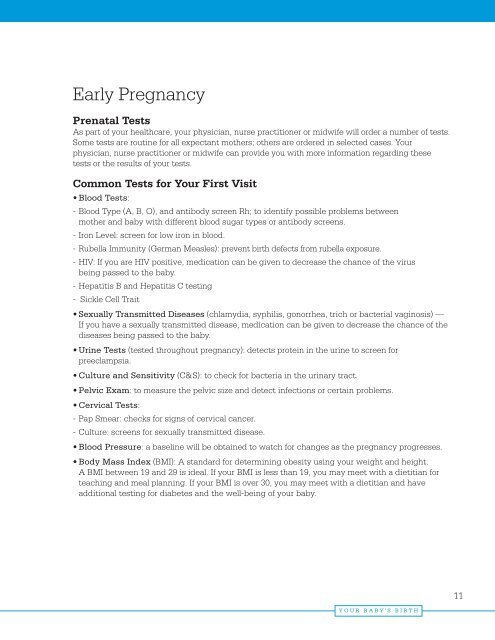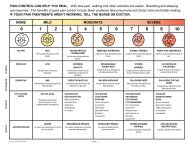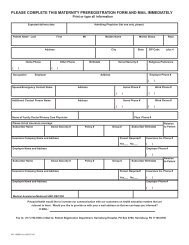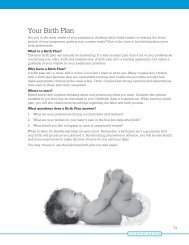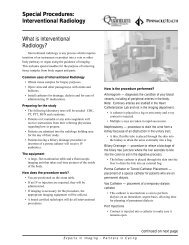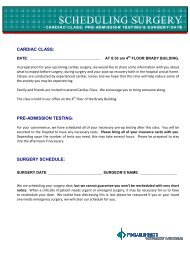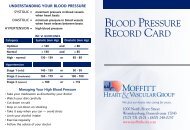Your Baby's Birth - Pregnancy & Childbirth Home
Your Baby's Birth - Pregnancy & Childbirth Home
Your Baby's Birth - Pregnancy & Childbirth Home
Create successful ePaper yourself
Turn your PDF publications into a flip-book with our unique Google optimized e-Paper software.
Early <strong>Pregnancy</strong><br />
Prenatal Tests<br />
As part of your healthcare, your physician, nurse practitioner or midwife will order a number of tests.<br />
Some tests are routine for all expectant mothers; others are ordered in selected cases. <strong>Your</strong><br />
physician, nurse practitioner or midwife can provide you with more information regarding these<br />
tests or the results of your tests.<br />
Common Tests for <strong>Your</strong> First Visit<br />
• Blood Tests:<br />
- Blood Type (A, B, O), and antibody screen Rh; to identify possible problems between<br />
mother and baby with different blood sugar types or antibody screens.<br />
- Iron Level: screen for low iron in blood.<br />
- Rubella Immunity (German Measles): prevent birth defects from rubella exposure.<br />
- HIV: If you are HIV positive, medication can be given to decrease the chance of the virus<br />
being passed to the baby.<br />
- Hepatitis B and Hepatitis C testing<br />
- Sickle Cell Trait<br />
• Sexually Transmitted Diseases (chlamydia, syphilis, gonorrhea, trich or bacterial vaginosis) —<br />
If you have a sexually transmitted disease, medication can be given to decrease the chance of the<br />
diseases being passed to the baby.<br />
• Urine Tests (tested throughout pregnancy): detects protein in the urine to screen for<br />
preeclampsia.<br />
• Culture and Sensitivity (C&S): to check for bacteria in the urinary tract.<br />
• Pelvic Exam: to measure the pelvic size and detect infections or certain problems.<br />
• Cervical Tests:<br />
- Pap Smear: checks for signs of cervical cancer.<br />
- Culture: screens for sexually transmitted disease.<br />
• Blood Pressure: a baseline will be obtained to watch for changes as the pregnancy progresses.<br />
• Body Mass Index (BMI): A standard for determining obesity using your weight and height.<br />
A BMI between 19 and 29 is ideal. If your BMI is less than 19, you may meet with a dietitian for<br />
teaching and meal planning. If your BMI is over 30, you may meet with a dietitian and have<br />
additional testing for diabetes and the well-being of your baby.<br />
11<br />
Y O U R B A B Y ’ S B I R T H


